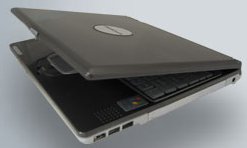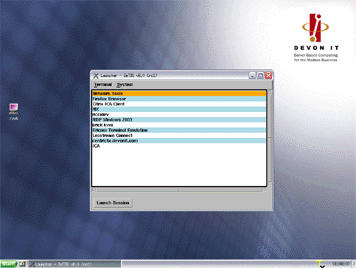Thin client runs dual monitors
Mar 12, 2009 — by LinuxDevices Staff — from the LinuxDevices Archive — 16 views Devon IT announced a thin client that uses Intel's Atom N270 processor and supports dual HD displays. The “TC5X/XW” offers up to 2GB each of RAM and DOM, plus gigabit Ethernet and optional WiFi, and is available with Devon IT's DeTOS Linux distribution.
Devon IT announced a thin client that uses Intel's Atom N270 processor and supports dual HD displays. The “TC5X/XW” offers up to 2GB each of RAM and DOM, plus gigabit Ethernet and optional WiFi, and is available with Devon IT's DeTOS Linux distribution.
(Click here for a larger view of Devon IT's TC5X/XW)
 Dell's Optiplex FX160 (Click image for further information) |
We've encountered surprisingly few thin clients with Intel Atom CPUs, though these processors seem to have cropped up in every other type of computer. Of the thin clients that do employ Atoms, most have gone with Intel's “nettop” versions, the single-core Atom 230, or the dual-core Atom 330. One example of a thin client offering both nettop Atoms is Dell's Optiplex FX160, shown at right.
For its Atomic thin client, Devon IT has selected the 1.6GHz N270 more typically found in netbooks, along with the mobile-oriented 82945GSE northbridge and ICH7M southbridge. This chipset keeps the TC5X/XW's power consumption down to between 14 Watts and 20 Watts, even when two monitors are being used, the company says.
The TC5X/XW supports dual independent displays via one DVI-D connector and one DVI-I connector, according to Devon IT. While the ability of the 82945GSE to provide HD video with adequate frame rates has been called into question by netbook reviewers, the TC5X/XW is claimed to be HD-ready and to deliver 1920 x 1200 resolution on each of two screens.
 Devon IT's SafeBook (Click for details) |
Devon IT teams the N270 processor with 1GB of RAM, expandable to 2GB, and 1GB of DOM (disk on module) storage for the Linux version (or 2GB DOM for Windows XP Embedded). Featuring gigabit Ethernet and an optional 802.11b/g/n wireless LAN module, the TC5X/XW has four USB ports, a microphone input, line output, and a headphone jack, according to the company.
As with earlier Devon IT thin clients, such as its SafeBook notebook model (pictured above, right) the Linux version of the TC5X/XW uses Devon IT's own Linux-derived operating system, DeTOS (Devon terminal operating system) (see image below), which offers a Firefox 2.x browser. Both the Linux and Windows XPe images include the Leostream Connection Broker, plus support for protocols including NoMachine NX, RDP (remote desktop protocol), ICA (independent computing architecture), and VNC (virtual network computing).

DeTOS 6.0 desktop
Features and specifications listed by Devon IT for the TC5X/XW include:
- Processor — 1.6GHz Atom N270
- Memory — 1GB of DDR2 RAM, expandable to 2GB
- Storage — 2GB DOM (disk on module) on Windows XPe version; 1GB DOM with DeTOS
- Display — Supports dual displays via DVI-D and DVI-I connectors; resolutions to 1920 x 1200
- Networking — Gigabit Ethernet port with RJ45 connector; optional 802.11b/g/n wireless LAN module
- Other I/O:
- 1 x DVI-D
- 1 x DVI-I
- 4 x USB 2.0
- Audio — headphone and line outputs and microphone input
- 1 x DVI-D
- Operating temperature — 0 to 40 deg. C (32 to 104 deg. F)
- Power requirements:
- Accepts 100 to 240VAC input
- Uses from 14 to 20 Watts with dual monitors
- Accepts 100 to 240VAC input
- Dimensions — 9.13 x 6.85 x 3.7 inches (232 x 174 x 94mm)
- Weight — 2.43 pounds (1.1kg)
- Operating system — Linux (DeTOS 6.0); Windows XP Embedded
Stated Stephane Verdy, CTO of Devon IT, “The TC5 with the Atom processor and its integrated GPU is capable of handling a high level of display updates, in the tens of megapixels per second. This provides an excellent experience for demanding users who require multi-monitor support, high-definition video and use high throughput devices such as VoIP headsets.”
Availability
Devon IT did not provide pricing for the TC5X/XW, but said the device is available now, and can be ordered via an IBM part number. Further information may be found on the company's website, here.
This article was originally published on LinuxDevices.com and has been donated to the open source community by QuinStreet Inc. Please visit LinuxToday.com for up-to-date news and articles about Linux and open source.